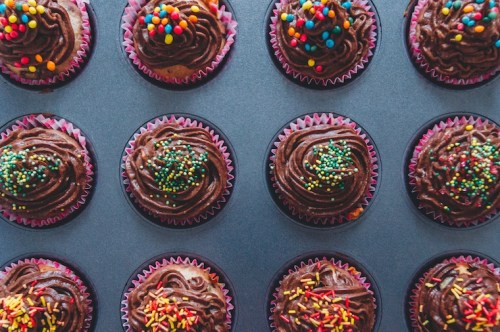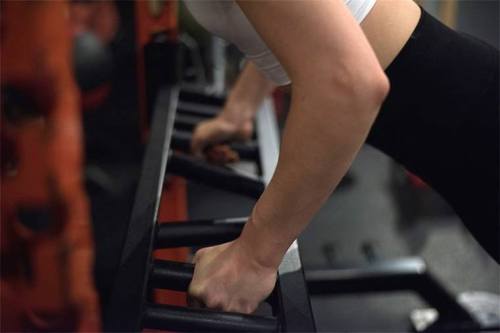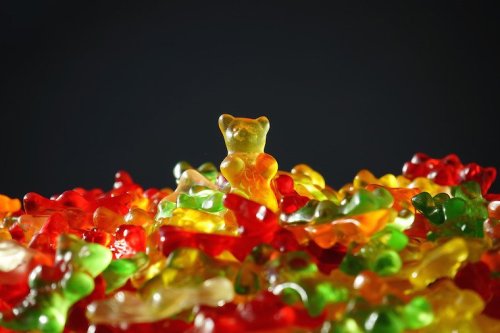Our editors independently select these products. Making a purchase through our links may earn Well+Good a commission
Should you eat cookies and ice cream before you work out?
Expert fitness trainers and nutritionists weigh in whether eating sugary junk food before a workout helps you have a better workout.

Sugar is the dietary evil de rigeur, linked to everything from disease-promoting inflammation to obesity and heart disease. But there might be one situation in which it can actually boost your health.
It all started with a low-energy day during my pull-up training at Soho Strength Lab a few months ago, when trainer-nutritionist Albert Matheny, MS, RD, handed me a cookie and ordered me to eat it before I attempted more reps.
“For athletic performance, it’s the opposite of what we recommend for weight loss and overall healthy eating. For instance, I tell people you usually need a balance of fat, protein, and fiber to slow things down,” Matheny says. “But for quick energy, you want rapid digestion and quick blood-sugar spikes—so sugar from refined foods.”
It’s the reason Gatorade (even the organic version) is formulated with plenty of sugar. Or why, when ultra runner Karl Meltzer recently set the Appalachian Trail record, he snacked on Spree and Three Musketeers while averaging 50 miles per day for 45 days; when his team found him napping at one point, they fed him a pint of ice cream to wake him up.
Like a lot of nutrition advice, however, some people disagree, and there are caveats. Here’s what you need to know.

How sugar gives you power
Let’s back up a bit. In case you forgot, sugar is a carb, and carbs are your body’s main energy source. Most sources of sugar you ingest (like plain old white table sugar) are made up of a mix of fructose and glucose. Fructose is processed by your liver, while glucose is released into your bloodstream more quickly, prompting an insulin response. So for fast energy, Matheny says you want easy access to that glucose, and fruit sources—like blueberries—will slow down the digestion thanks to fiber (which is normally a good thing, but not here). If you eat a cookie or donut, made with refined ingredients, there’s little else to slow it down, and the glucose will make its way into the bloodstream super fast, presenting itself to your muscles as fuel.
“The worst thing you can do is come into a workout and have low blood sugar. Within the first five minutes, you feel like shit,” Matheny says. “But if you give yourself this energy source to draw from, your output is going to be better throughout the workout.” In other words, you’ll be able to run faster, lift more, jump higher. So even if you’re trying to lose weight by cutting carbs, the 200-calorie scone is not going to make or break your weight-loss plan. “It is going to give you energy to burn more than that calorie-wise during your workout and build lean muscle, which is the ultimate goal if you’re trying to lose weight,” he says.
The counter argument? Everyone’s body processes and digests food at different speeds, says Robin Barrie, MS, RD, a personal trainer and nutritionist who works with Manhattan fitness spot The P.E. Club. “There is no way to be certain that the jellybeans you eat before your workout are what is going to be used for your dead lifts or bench presses,” she says. Plus, the sugar may also be unnecessary. “If exercisers are eating normal meals and snacks at regular intervals, they should have sufficient energy stores—glycogen—in their muscles and liver to power through their workout.”

Won’t it sabotage long-term health?
Of course, sugar could also cause diabetes. But Matheny says the health issues associated with the sweet stuff primarily stem from when sugar in your bloodstream is not being utilized. “Then your body has to pump out insulin and things like that to manage it…and it’s going to repackage it and store it as fat,” he says. But if your muscles are eating it up immediately, that won’t happen. “It’s not sticking around; it’s being used,” he adds.
You don’t want to totally discount the other things that may be in refined sweets, cautions Barrie, like additives, preservatives, and artificial colors and flavors. “None of these have beneficial effects on the body. Even if you are active and these unhealthy foods don’t cause weight gain in the present, these items do increase risk for disease,” she says.

Glucose guidelines
Important: If you want to give this strategy a shot, we’re talking about fueling intense workouts that involve burpees, weight training, or running at a quick clip. Most group fitness classes will qualify, but do not eat a Twinkie before restorative yoga. Matheny says you’ll need sugar for any workout that’s “more than 20-minutes where you’re working out at a high intensity.”
Try to eat it very soon before you start, as in 10 to 15 minutes prior to getting sweaty. Think refined foods that are high in sugar, so even a vegan ice cream cone will work. Just pay attention to how your stomach responds to food. If dairy doesn’t sit well with you, for instance, those jumping jacks are going to be miserable after a sugary yogurt parfait. And to avoid the suspect ingredients Barrie mentions, choose sources of sugar that don’t come with other potentially harmful effects. Something like, say, Justin’s Dark Chocolate Peanut Butter Cups, would be extra helpful, since chocolate is an energy-boosting stimulant, too. You’re welcome.
More muscle-building meal ideas: A Paleo guru shares pre- and post-workout recipes for all different kinds of sweat sessions. And if you need a guide to whip yourself back into shape, follow Emily Skye’s fall fitness plan.
Sign Up for Our Daily Newsletter
Get all the latest in wellness, trends, food, fitness, beauty, and more delivered right to your inbox.
Got it, you've been added to our email list.










